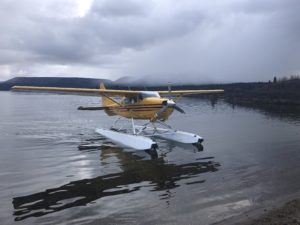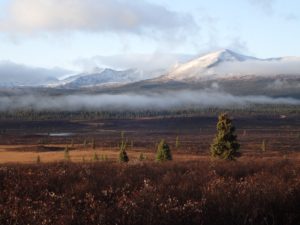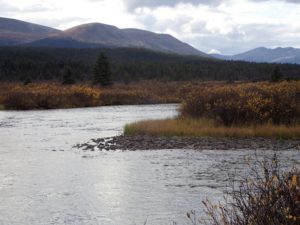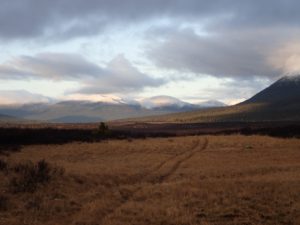
Our transportation in the Yukon
And just like that, we were on a float plane traveling from Whitehorse, the largest chunk of civilization in the Canadian Yukon, starting a 175-mile flight into a wilderness adventure. Since we only hold a minute long enough to rescue it from waste, alongside my basic life necessities, I packed a desperate hope to make each tick of our trip clock, each block of the calendar count for eternal good. J.R. Gregory writes, “The best way to prepare for the last moment is to use the present well.”
In my ground zero after Maggie’s death, I planted a longing to learn to number my days (Psalm 90:12) – literally to act as if I could view life from beginning to end at a glance. In evaluating each day, we allow God to remove the regret from a wasted yesterday, transform its nature, and transfer its weight into the present with the result being a today of eternal significance. In Part One, I shared the missed opportunity I longed to revisit (read here). I had no guarantee it remained open, but I wouldn’t find peace until I checked.
Open doors. Paul encourages us in Colossians 4:3-6 to pray to find them as we go our way. These open doors, according to the apostle, are nothing more than an invitation to speak about the mystery of Christ. They are an opportunity for our conversations, seasoned with grace, to penetrate outside the walls of our church, Christian culture, and intimate circles. Doors crack open anywhere we act with wisdom toward outsiders (non-Christians) even in a small camp in the wilderness of Canada. Spurgeon says, “God made you for an end. Find out what that end is; find out your niche and fill it. If it be ever so little, if it is only to be hewer of wood and drawer of water, do something in this great battle for God and truth.”

A view from our camp
The final leg of our journey took us from lake to camp in an Argo – an ATV designed to handle the bumpy, boggy, bushy terrain we were to call home for the next ten days. Phil had so undersold the charms of our camp – in an effort to lower any possible expectation of comfort – that I was mildly surprised to find a warm, dry, cushioned bunk waiting near a wood stove surrounded by four walls with a functional outhouse nearby. (Yes, much of that had been in doubt). We shared the small cabin with our outfitter and his 21- and 18-year-old sons. Living life pared back to essentials is not as unpleasant as it may sound. Other than the occasional hum of a float plane making a delivery in the area, we were unaware of the outside world. No internet. No TV. No phone (except the satellite one for emergencies). No place to be except in the moment. Even the potential threat of grizzlies and wolves could not break the lure of rustic life.
Life stripped of its distractions is more in tune with the eternal purposes of God. I don’t know if we do it knowingly to escape His call on our lives, but we allow noise and busy-ness to eat away our time and crowd out His voice. I’m guilty too often of hiding behind an agenda of my own to avoid encountering the needs screaming out loud. Dietrich Bonhoeffer, hitting me square between the eyes as he hammers the nail, says, “Flight into the invisible is a denial of the call. A community of Jesus which seeks to hide itself has ceased to follow him.” Has the church ever had so many hiding in plain sight? When I stuff junk into the space that hungers and thirsts for Him, I dampen the creak of hinges, and I forfeit the privilege of being His instrument. The encouragement of looking for opportunities is that our sovereign God does the heavy lifting – opening the door – and we have only to keep ears and eyes open – unchained from diversions. And the way He performs is nothing short of miraculous.
Phil had several discussions in early mornings over coffee with our outfitter about what we had learned on our journey with Maggie. The response, hardly surprising and typical of most who are lost, was a simple “I just don’t think about it” when confronted with eternity. But a seed was planted, and he did have to think about it, at least for a few minutes. I kept praying for a chance to connect with his younger son because I sensed his search for Something. He once tried to read a hotel copy of the Bible once but had trouble understanding it and quit. The morning of our departure, I lifted one more desperate prayer.
A few hours later, we were trying to recall the exact date of our arrival when the son pulled out his phone. He confirmed the date and continued to idly flip through the calendar app. “What’s Passover?” he asked. I stole a glance at Phil as if to ask are you kidding me? Did he really ask that? What better place to start speaking about the mysteries of Christ than the Passover? So, we did. And then he asked, “What is Good Friday?” He knows now. And we have an opportunity to send a relatable Bible translation to a young man in Canada.
Classic novelist Robert Louis Stevenson (Treasure Island) offers sound advice when he shares, “Don’t judge each day by the harvest you reap but by the seeds that you plant.” We didn’t leave any new converts in Canada. But we left a door standing slightly more ajar than when we arrived. And we return with a fresh approach to each day – a way in the wilderness our hearts become when pulled to distraction by competition from lesser desires. God alone can rescue a life; but we pave the road in the minutes we rescue from regret and waste.

A small path from our cabin
Amazing insight. Wisdom fashioned on God’s anvil. Thank you. I’ve been thinking along your lines and it was just out of my grasp to understand the importance of counting our days.
I love reading your blogs. Praying for y’all through each new journey. Praying for saftey, seeds you plant, and those who water those seeds.
This is an incredible story!!! May we be bold in planting seeds!!!! ❤️
Thank you, Melissa, for the great reminder…Be still and know that I am God.